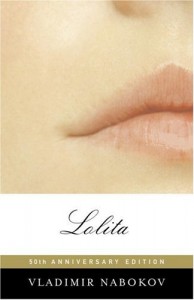 Wonderful Language, Dull Story
Wonderful Language, Dull Story
Nabokov, Vladimir. (1955). Lolita. New York: Vintage 50th Anniversary Edition.
This is a book whose reputation precedes reading. Everyone knows the story of a middle-aged man’s sexual obsession with a twelve-year-old girl. Humbert Humbert, a European gentleman, confesses his perversion in a diary or memoir, in which he sometimes slips into the second-person voice to address the reader directly, for example, to plead for merciful judgment. He is not an amoral psychopath. He knows his obsession with prepubescent “nymphets” is socially wrong, but can’t help himself, he says.
In America, he rents a room from a woman whose daughter is Lolita, the nymphet of his dreams. To gain access to her, he marries the mother, then considers killing her, but she conveniently dies in an accident, leaving Humbert the sole guardian (possessor) of Lolita. They go on a road trip during which time he has complete sexual access to her, keeping her almost a kidnap victim under his jealous gaze. Lolita, it turns out, is not sexually naïve and cooperates with Humbert in exchange for toys and candy. Sexual contact between them is described but never “shown” in graphic detail. The book is pornographic in concept but not literally.
The second part of the book is a long travelogue of their journey through the US in 1950 or so. Descriptions of cheesy motels, restaurants, and gas stations are perfection of the art of literary observation. Nabokov’s language throughout is creative, playful, humorous, and diverse, with plenty of untranslated French expressions (I think Humbert was supposed to be Swiss), and the occasional poem. Literary and historical allusions abound, making the novel a pleasure to read.
In fact Nabokov’s writing is the only reason anyone should read this book. Unless you happen to be a pedophile, you will find the story uninteresting and dramatic tension just barely showing a pulse through manufactured mini-crises that are more humorous than tense. Humbert repeatedly declares his heartfelt love for Lolita, even as he sexually abuses her. But we don’t believe for a moment that Humbert has any concept of love beyond his own selfish obsession. There is nothing to make us connect to Humbert except his clever language and foppish mannerisms. Likewise, Lolita is a snarky, dirty, rude, and undereducated youth who reveals no interior life. So we have two cartoon characters tossing about clever language for 300 pages.
In my opinion, the scintillating language and insightful description justify the entire novel. But as an interesting or dramatic story, or as a character study, or as an exercise in unreliable narration, the book falls flat.
Some readers say they are repelled by the basic concept of a pedophile acting out his fantasies, and are unable to read the book. I can understand a reader objecting on aesthetic or technical grounds, but not on moral grounds. Such readers (or non-readers) are afraid of their own imaginations, a truly scary proposition.
We read Lolita sentences like these:
“She was, obviously, one of those women whose polished words may reflect a book club or bridge club, or any other deadly conventionality, but never her soul; women who are completely devoid of humor; women utterly indifferent at heart to the dozen or so possible subjects of a parlor conversation, but very particular about the rules of such conversations, through the sunny cellophane of which not very appetizing frustrations can be readily distinguished.”
“…Charlotte …thought my mirth improper; but otherwise her autobiography was as devoid of interests as her autopsy would have been.”
“We passed and re-passed through the whole gamut of American roadside restaurants, from the lowly Eat with its deer head (dark trace of long tear at inner canthus), ‘humorous’ picture post cards of the posterior ‘Kurort’ type, impaled guest checks, life savers, sunglasses, adman visions of celestial sundaes, one half of a chocolate cake under glass, and several horribly experienced flies zigzagging over the sticky sugar-pour on the ignoble counter; and all the way to the expensive place with the subdued lights, preposterously poor table linen, inept waiters (ex-convicts or college boys), the roan back of a screen actress, the sable eyebrows of her male of the moment, and an orchestra of zoot-suiters with trumpets.”

Those horribly experienced zigzagging flies haunt me.